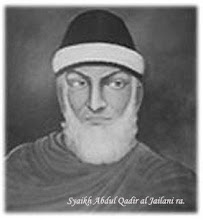Hadrat Ali, The Gate of Knowledge
Hadrat Ali was the most learned man of the age. He was a living encyclopaedia of knowledge. The holy Prophet said, "If I am the City of Knowledge, verily Ali is the Gate of it." He was the first person to have learned the Holy Qur'an by heart. He possessed a prodigious memory and he was a keen observer; he was a deep thinker; he had an enlightened mind and he carried a vast storehouse of knowledge in his brain. He was a versatile genius and he exhibited extraordinary talents in all disciplines of knowledge. He was a master of philosophy and rhetoric. He was a distinguished poet. He was a great teacher and preacher. His knowledge extended to such disciplines as logic, mathematics, physics, astronomy, medicine and history.
His concept of Knowledge
Hadrat Ali held that the principal aim of knowledge was the inculcation of virtue, promotion of faith, and understanding of God. He held that knowledge enlivens the soul, for it kills ignorance. He defined knowledge as the sum total of excellence. He held that the pursuit of knowledge is better than the pursuit of riches, that knowledge is the ornament of the rich and the riches of the poor and that knowledge is better than riches. He held that the learned live even after their death. He maintained that the learned were the living ones in the dead mass of ignorance. He observed that to respect the learned was to respect God. With regards to the respect of the teacher, he held that one who teaches you a letter binds you with the fetter of gratitude. He maintained that the talk of the learned man carried within it the fragrance of the garden of Paradise.
Superiority of knowledge over wealth
It is related that once ten learned men approached Hadrat Ali. They wanted to know how knowledge was better than wealth and they requested that each one of them be given a separate answer. Hadrat Ali answered them as follows:
(1) Knowledge is the legacy of the Prophet, whereas wealth is the inheritance of the Pharaohs. As the prophets are superior to the Pharaohs, so knowledge is better than wealth.
(2) You have to guard your wealth, but knowledge will guard you. Therefore, knowledge is better than wealth.
(3) When knowledge is distributed it increases. When wealth is distributed it decreases. As such knowledge is better than wealth.
(4) A man of wealth has many enemies, while a man of knowledge has many friends. Therefore knowledge is better than wealth.
(5) A learned man because of his wider outlook is apt to be generous, while a rich man because of his love for money is apt to be miserly. As such knowledge is better than wealth.
(6) Knowledge cannot be stolen, but wealth is constantly exposed to the danger of being stolen. Accordingly, knowledge is better than wealth.
(7) With the lapse of time, knowledge gains in depth and dimension. Hoarded coins get rusty or cease to be legal tender. Therefore knowledge is better than wealth.
(8) You can keep account of wealth because it is limited, but you cannot keep account of knowledge because it is boundless. That is why knowledge is better than wealth.
(9) Knowledge illuminates the mind, while wealth is apt to darken it. Therefore knowledge is better than wealth.
(10) Knowledge is better than wealth, because knowledge induced the holy Prophet to say to God "We worship Thee as we are Thy servants," while wealth engendered and Pharaoh and Nimrod caused the vanity that made them claim godhead.










No comments:
Post a Comment